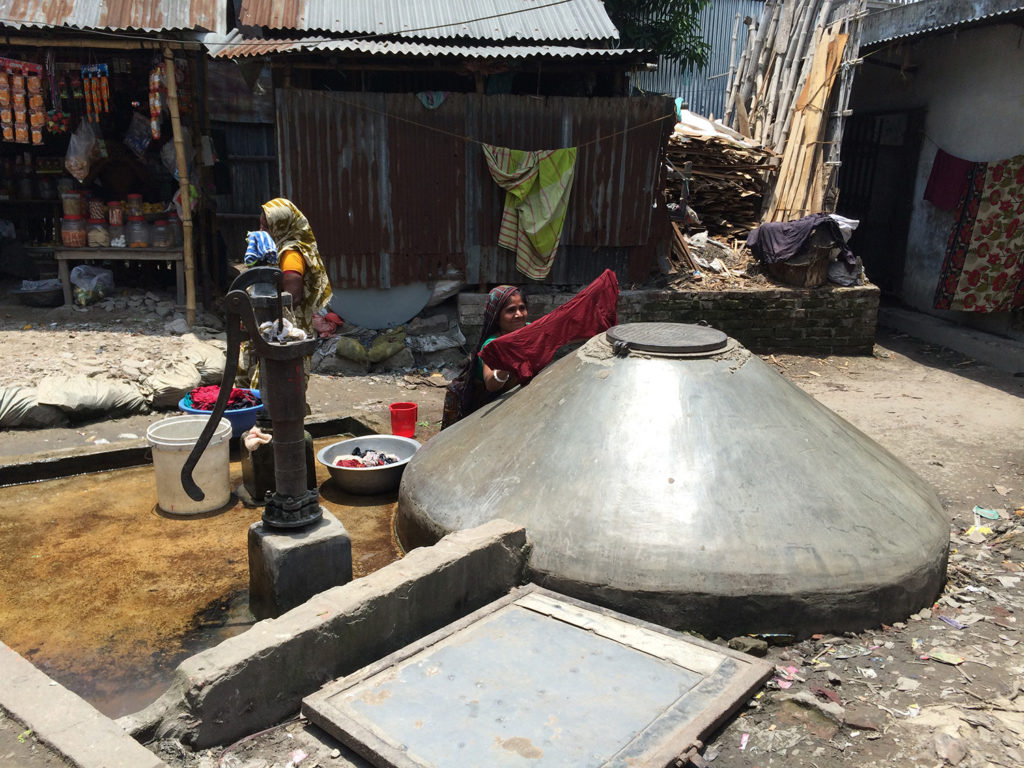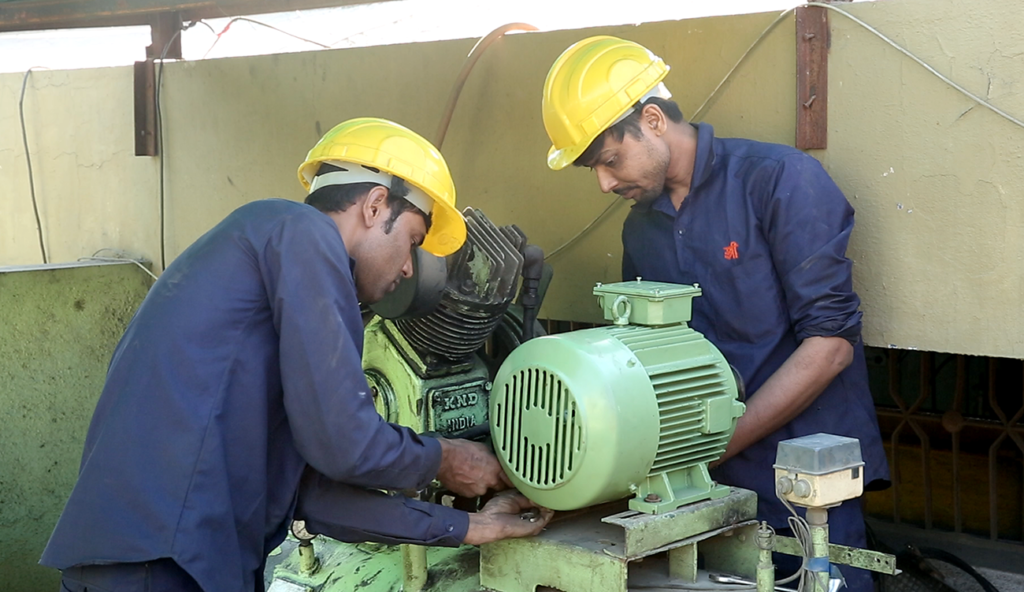While the epicenter of the coronavirus pandemic is currently in the United States and Europe, much of its damage and impacts will be determined by its spread in low-and-middle income countries, i.e. the Global South, with billions of people still in the initial stages of the pandemic. Almost half of the world’s population – three billion people – lack access to basic handwashing facilities. The prevalence of air pollution in developing countries is resulting in greater risk of death from the disease. High population density in urban areas—particularly in Asia, home to 85% of the world’s most crowded cities—makes social distancing more challenging. Healthcare centers across the developing world lack the clean water, sanitation services, and protective equipment to prevent widespread infection.
And that’s to say nothing of the economic crisis. The income freeze caused by social distancing and the collapse of developing countries’ exports is creating an economic shock that is outpacing the disease itself. The International Labour Organization predicts 195 million job losses worldwide. The shutdown of non-critical industry has triggered mass migrations. With 10% of the world’s population living below the poverty level, and with local governments unable to offer safety nets, COVID-19 is triggering an enormous humanitarian and food security crisis that may erase years of hard-fought progress made by developing countries throughout the world.

As terrifying and tragic as the pandemic is proving to be, it likely can’t hold a candle to the shattering social and economic consequences we know climate change could bring. COVID-19 is a finite crisis, one that we can hope to beat back in six or 12 months with changes in behavior and practice and, most importantly, with the development of a vaccine. Climate change, by contrast, has no vaccine. It poses a threat that is exponentially larger, far less reversible, and ultimately existential in nature. And its consequences are not far-off figments of our imagination, but are unfolding even now in the form of sea level rise in Bangladesh, droughts and floods in Vietnam, sinking cities in China, and famine in sub-Saharan Africa.
Climate-driven stresses exacerbate the effects of COVID-19 in these and other locations, just as the pandemic cripples the ability of people and institutions to respond effectively to those stresses. COVID-19 foreshadows the scope and scale of how people will suffer from global warming—hitting people living in poverty and other vulnerable populations the hardest—while underscoring how utterly unprepared we are for this kind of prolonged, life-altering fight.
COVID-19 foreshadows the scope and scale of how people will suffer from global warming—hitting people living in poverty and other vulnerable populations the hardest—while underscoring how utterly unprepared we are for this kind of prolonged, life-altering fight.
Responding to COVID-19 and Tackling Climate Change: Not a Zero-Sum Game
At first glance, it might be tempting to see the blue skies over Delhi and hope that COVID-19 will offer a new normal of reduced pollution and GHG emissions. Maintaining these reduced pollution levels will be a challenge, as coronavirus is taking resources away from the fight against climate change. The UN has shifted its focus from climate change to COVID-19, and the WHO has urged all countries to make containing the outbreak their top priority. Governments across the world have relaxed critical environmental safeguards, with no indication of if or when they might be reinstated.
We are not playing a zero-sum game, and we fail to recognize this at our peril. Responding to COVID-19 and mitigating/preparing for climate change are not mutually exclusive endeavors. Indeed, they are mutually reinforcing. Equitable, low-carbon solutions that build resilience to the pandemic are not only possible, they are a matter of life and death for many around the globe—right now, and for decades to come. Any effective response to COVID-19 will necessarily be a climate-smart response.
What Does Climate-Smart Pandemic Recovery Look Like?
COVID-19 is pushing us to revisit widely-accepted assumptions about what governments, institutions, and individuals are capable of—rapidly implementing unpreceded lockdowns and spurring innovations and new digital platforms in an impressively short timeline. China, for example, built new hospitals at a record pace. The pandemic is also revitalizing civic engagement and community solidarity, while pressing us to think about what collaboration looks like when we can’t physically gather together.
We can harness this systemic energy and newfound social capital not just to optimize our response to the COVID-19 crisis, but to strengthen global climate action and build resilience to the crises it too causes, now and in the future. We quite literally can’t afford to squander this opportunity.

There is no vaccine for climate change, but with the right investments and preparation, we can still inoculate the most vulnerable to its worst effects.
The first thing we can do is double down on mitigating climate change. If we could have foreseen COVID-19 five years or even two years ago, we’d have made efforts then to prevent the crisis before it started. The one advantage we have with climate change is that we know very well what’s coming. If we act now, we may still be able to reduce or forestall its worst effects. COVID-19 offers a test lab for new approaches that also have potential to reduce our carbon footprint, such as expanding digitization, opening up pathways for remote work, revamping trade policies, and shifting toward more sustainable consumption patterns.
The second thing we can do is ensure that as we focus on recovering from the pandemic, we take care to build resilience to climate-driven shocks and stresses. There is no vaccine for climate change, but with the right investments and preparation, we can still inoculate the most vulnerable to its worst effects. There are many things we can do in this direction:
- Cultivate sustainable communities. Cities and communities around the world need to accelerate planning and investment in resilient infrastructure and systems to address both the pandemic and climate change in parallel. This requires supporting urban sustainability professionals and grassroots community organizations to ensure they are equipped with the skills and knowledge they need to anticipate and lessen their vulnerability to shocks. It includes investing in critical food, water, energy, and transportation infrastructure, and strengthening emergency preparedness and response systems. Equity must be at the core of this, ensuring participation by and benefit to vulnerable communities.
- Invest in climate-resilient and equitable infrastructure. Government leaders at all levels, in addition to regional development banks and bilateral assistance, should continue to press forward with climate action by tying economic recovery stimulus and tax breaks to decarbonization, tackling air pollution, implementing nature-based solutions, and building a circular economy in a way that responds to the needs of vulnerable populations. Historically low interest rates, combined with the positive ROI of climate-smart investments, provide a compelling value proposition to realize the co-benefits of economic recovery and environmental sustainability.
- Build more sustainable supply chains. The COVID-19 recovery will trigger a massive re-growth opportunity across the global economy. While some supply chains may shorten towards domestic production, increasing the resilience of global supply chains will remain a key priority. Green finance can enhance supply chain resiliency by improving energy efficiency, diversifying energy sources with renewables, supporting improved risk management, and strengthening the linkages between factories and the communities where they operate. Companies that actively plan for climate generate returns 18% higher than those who fail to do so. This can be achieved by increasing the number and quality of sustainability managers in factories in developing countries—managers capable of reducing industry reliance on fossil fuels, improving worker health and safety, and strengthening relationships with local communities.
- Accelerate green skilling and job growth. According to the New Climate Economy, a smart COVID-19 recovery strategy could spur the creation of 65 million new green jobs and generate $26 trillion of global net growth beyond a business-as-usual scenario. In order to drive inclusive growth, we need to support workers around the world with the training and resources they need to take advantage of these emerging opportunities.
COVID-19 is providing us with extremely valuable feedback on how human society can succeed or fail in preparing for and in managing a global crisis. We must seize the opportunity to learn from the pandemic to better prepare for what may be the most devastating crisis we will face, climate change. Hundreds of organizations have already signed a petition for just recovery, calling for stimulus investments that put the needs of people first and promote development that integrates health, climate, and economic justice.
Given the severity of the threats facing developing countries now and in years to come, we must leverage every opportunity to tackle COVID in a way that ensures we preserve the planet for future generations, building a future shaped and shared by all.
Brent Habig is VP of International Programs at the Institute for Sustainable Communities (ISC), where he works with country directors to develop ISC’s international strategy, vision, and program portfolio.
Since 1991, ISC has led more than 115 transformative community-driven sustainability projects in 30 countries including the United States, China, India, and Bangladesh. ISC helps unleash the existing power of local people and institutions to address immediate social, economic, and environmental challenges and opportunities – all while building those on-the-ground solutions into national and international best practices and policy. At the heart of the organization’s approach is results-focused, authentic, and pragmatic engagement with all stakeholders, which unearths locally-driven and equitable solutions to the biggest challenge we face – global climate change. Learn more at sustain.org
Additional Reading
- Gardiner, Beth. “Coronavirus Holds Key Lessons on How to Fight Climate Change,” Yale Environment 360, 23 March 2020.
- Schwab, Klaus and Guido Vanham. “What we must do to prevent a global COVID-19 depression,” World Economic Forum, 13 April 2020.
- Tooze, Adam. “The Coronavirus Is the Biggest Emerging Markets Crisis Ever,” Foreign Policy, 28 March 2020.
